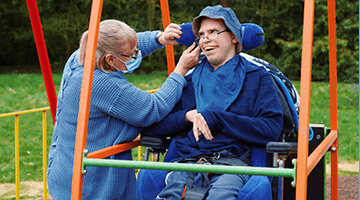Complex Health Needs
At Dimensions we provide tailored care for people with autism and complex disabilities. We work with over 80 local authorities and the NHS to deliver personalised, high-quality care.
What are Complex Health Needs?
These involve multiple conditions, such as learning disabilities, mental health issues, or physical challenges, that require specialist management. Proper care can improve quality of life and prevent conditions from becoming life-limiting. Complex health care takes into account all of the conditions experienced by someone, including complex learning disabilities, complex mental health needs, and those that may become life-limiting if managed incorrectly.

Our Approach
We take a person-centred approach, offering care at home where possible. Each plan is tailored to the individual, ensuring their health and wellbeing are prioritised. . By ensuring effective health management, we help people like John, Karen and Katy, thrive and seize opportunities for community engagement and independence.
We passionately believe that good support around health and personal care is essential for a good life; often, behaviours of distress occur because a person is not in good health. Living in the right home plays a key part, too.
Types of Complex Care We Offer
- Learning Disabilities: Includes autism, Down syndrome, ADHD, and more.
- Mental Health Needs: For conditions like bipolar disorder or schizophrenia.
- Physical Disabilities: Covers conditions like cerebral palsy and multiple sclerosis.
- Acquired Brain Injuries (ABI): From trauma, strokes, or infections.
- Spinal Cord Injuries: Includes support for mobility and independence.
How We Help
We ensure access to GP care, create personalized support plans, and advocate for well-being.
We support NHS programs like STOMP (reducing unnecessary medication) and LeDeR (reducing premature deaths in people with learning disabilities).
Funding Support
We collaborate with local authorities to secure funding under laws like the Care Act (2014) in England. Funding covers essential needs, such as personal care, education, and access to the community.
Contact Us
Want to learn more or discuss your care needs? Contact Dimensions—we’re here to help.
